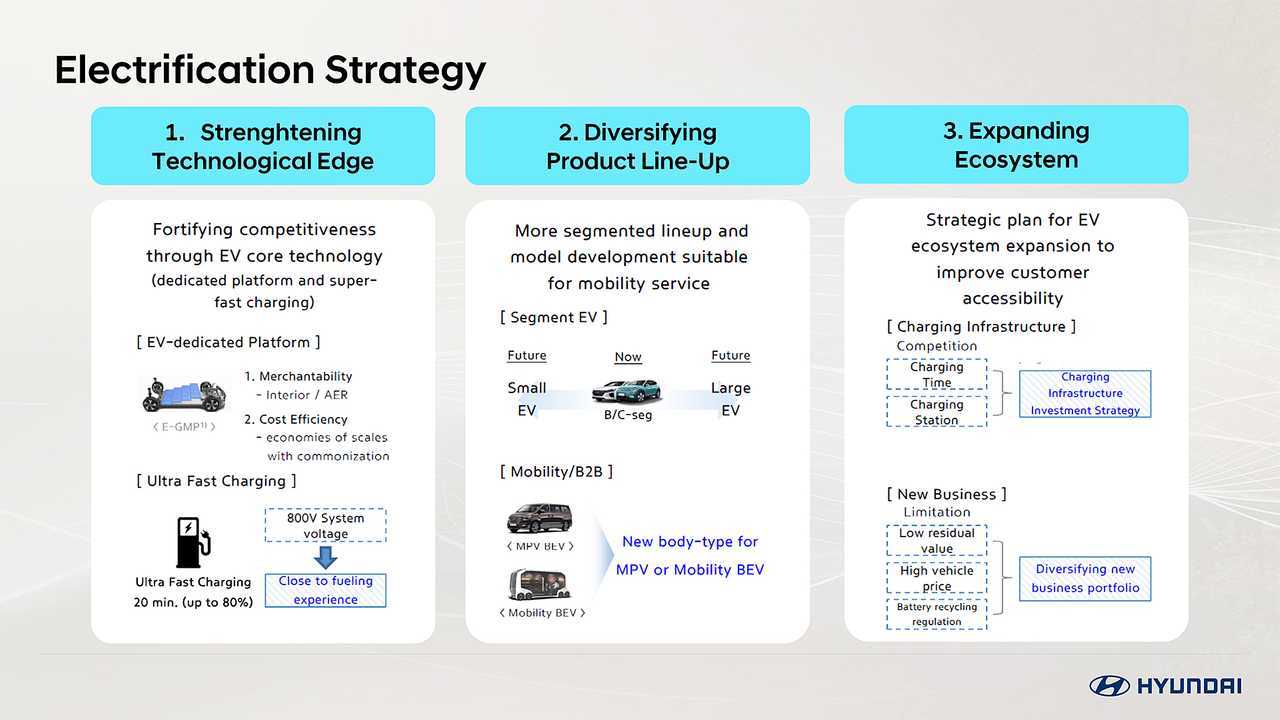
Confirmation comes from the workshop #NextAwaits of Zurich, Switzerland, where the South Korean House reveals plans for its future made more and more of electric, hybrid and fuel cell cars, from the smallest to the largest. A couple of data clarify even better the programs of the Hyundai Motor group: beyond 35 billion dollars (31.79 billion euros at today's exchange rate) of investments in the mobility of the future and 44 new alternative-powered models (of which 23 electric), all within the 2025.

41 Photo
The 800-volt electric platform is coming
Going a little further into the details of the upcoming Hyundai electrified cars, we find that in addition to the current Ioniq and Kona different zero-emission models will be offered. Everything is based on three pillars of developing the Korean electrified strategy.

One of these cornerstones is the enhancement of technologies, starting with the new platform for electric cars called e-GMP, scalable and usable on different models, but above all with an on-board network a 800 volts which allows ultra fast refills (80% of the full in 20%) and which until now has only Porsche Taycan. An anticipation of this powerful and autonomous electric over 500 km is the Hyundai 45 EV concept.

29 Photo
Small electric cars are also in sight
The second pillar is that of diversification of the electric range Hyundai, from the current B and C segments to the small ones city car and larger sedans and SUVs. The futures are also included in this strategy electric multi-space of Hyundai and different forms of future zero-emission mobility.

The third base of this process is represented by the expansion of the electric ecosystem, starting from the investments on the recharging infrastructures, in particular on the ultra fast balusters.

Next entry into Ionity
Hence the recent investment by Hyundai in Ionity, the European joint venture for ultra-fast charging of electric cars commissioned by various companies. A possible and forthcoming entry of Hyundai into the Ionity association, which is being perfected and expected for 2020, would lead to an enhancement of the network of ultra fast columns that allow you to tackle even long journeys without too long stops.

Hyundai also aims at fuel cell trucks
Turning instead to the front of hydrogen and fuel cell cars we find today the Hyundai Nexo, medium SUV with autonomy of 666 km (WLTP) and a power of 120 kW (163 hp). On the Korean the fuel cell has a record efficiency of 60% and more, little known, is able to purify the air.

In practice the operation of the fuel cell that sucks air to extract oxygen and make it react with the hydrogen captures in its filters the 99.9% of fine dust (Particulate matter). In perspective, however, hydrogen mobility will be increasingly oriented towards medium-large sized cars, but above all commercial vehicles, light and heavy.

With Alpiq for hydrogen in Switzerland
In this perspective, the Hyundai Hydrogen Mobility, a joint venture with H2 Energy that also aims to bring 1,600 fuel cell trucks to the roads of Switzerland by 2025. The ambitious hydrogen project HHM collaborates Alpiq, Swiss general contractor and provider of energy and services for large companies

This is the same company that offers domestic recharge packages with wallboxes to BMW and new Porsche Taycan customers. Among other things, it is the same Alpiq that is realizing in Italy with Eni and Ionity the first 350 kW charging stations in the service areas of the Italian oil tanker, motorways included.
Source link
https://it.motor1.com/news/382304/auto-elettriche-ricarica-veloce-idrogeno-futuro-hyundai/
Dmca




















